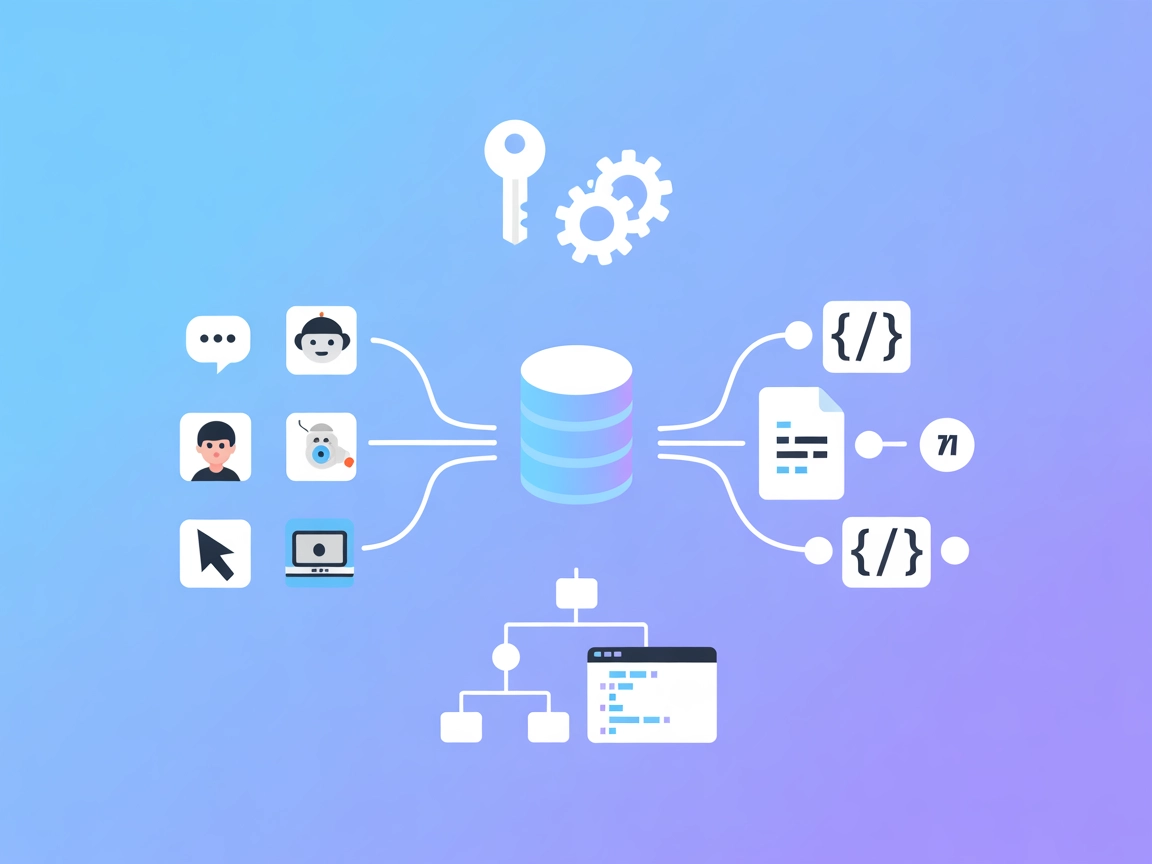
OpenAPI MCP Server
The OpenAPI MCP Server connects AI assistants with the ability to explore and understand OpenAPI specifications, offering detailed API context, summaries, and e...

Connect your AI agents to any JSON-RPC-compatible API with OpenRPC MCP Server, supporting dynamic method discovery, remote procedure automation, and streamlined backend integration.
FlowHunt provides an additional security layer between your internal systems and AI tools, giving you granular control over which tools are accessible from your MCP servers. MCP servers hosted in our infrastructure can be seamlessly integrated with FlowHunt's chatbot as well as popular AI platforms like ChatGPT, Claude, and various AI editors.
The OpenRPC MCP Server is a Model Context Protocol (MCP) server that provides JSON-RPC functionality via the OpenRPC specification. This server acts as a bridge between AI assistants and external JSON-RPC-enabled systems, enabling structured, programmable interactions with APIs and services that implement the JSON-RPC standard. By exposing tools like method discovery and remote procedure calls, the OpenRPC MCP Server empowers developers and AI agents to interact dynamically with various services, perform operations, and automate workflows. It enables tasks such as querying external systems, invoking custom methods, and integrating API-driven processes, thereby enhancing AI development workflows, debugging, and system integration.
No prompt templates are mentioned in the repository.
No explicit MCP resources are listed in the repository.
rpc.discover specification. Allows listing and exploring all supported methods on a given server.mcpServers object.{
"mcpServers": {
"openrpc": {
"command": "npx",
"args": ["-y", "openrpc-mcp-server"]
}
}
}
~/Library/Application Support/Claude/claude_desktop_config.json%APPDATA%/Claude/claude_desktop_config.json{
"mcpServers": {
"openrpc": {
"command": "npx",
"args": ["-y", "openrpc-mcp-server"]
}
}
}
{
"mcpServers": {
"openrpc": {
"command": "npx",
"args": ["-y", "openrpc-mcp-server"]
}
}
}
{
"mcpServers": {
"openrpc": {
"command": "npx",
"args": ["-y", "openrpc-mcp-server"]
}
}
}
To secure API keys, use environment variables and pass them via the configuration.
Example:
{
"mcpServers": {
"openrpc": {
"command": "npx",
"args": ["-y", "openrpc-mcp-server"],
"env": {
"MY_API_KEY": "your-api-key-here"
},
"inputs": {
"apiKey": "${MY_API_KEY}"
}
}
}
}
Using MCP in FlowHunt
To integrate MCP servers into your FlowHunt workflow, start by adding the MCP component to your flow and connecting it to your AI agent:

Click on the MCP component to open the configuration panel. In the system MCP configuration section, insert your MCP server details using this JSON format:
{
"openrpc": {
"transport": "streamable_http",
"url": "https://yourmcpserver.example/pathtothemcp/url"
}
}
Once configured, the AI agent is now able to use this MCP as a tool with access to all its functions and capabilities. Remember to change “openrpc” to whatever the actual name of your MCP server is and replace the URL with your own MCP server URL.
| Section | Availability | Details/Notes |
|---|---|---|
| Overview | ✅ | JSON-RPC bridge via OpenRPC |
| List of Prompts | ⛔ | No prompt templates listed |
| List of Resources | ⛔ | No explicit MCP resources listed |
| List of Tools | ✅ | rpc_call, rpc_discover |
| Securing API Keys | ✅ | Shown via env/inputs example |
| Sampling Support (less important in evaluation) | ⛔ | Not mentioned |
This MCP server offers clear, practical tooling for JSON-RPC integration and method discovery, but lacks prompt and resource primitives. Security via environment variables is supported. Its documentation is concise. Overall, it provides robust core functionality but is somewhat barebones compared to more feature-rich MCPs.
| Has a LICENSE | ✅ (Apache-2.0) |
|---|---|
| Has at least one tool | ✅ |
| Number of Forks | 10 |
| Number of Stars | 34 |
The OpenRPC MCP Server is a Model Context Protocol server that enables AI assistants to interact with external JSON-RPC-compatible systems. It provides method discovery and remote procedure call capabilities using the OpenRPC specification, making seamless API integration and automation possible.
It includes `rpc_call` for invoking arbitrary JSON-RPC methods and `rpc_discover` for listing available methods on a server, supporting dynamic integration and automation.
API keys and sensitive credentials should be set as environment variables in your MCP server configuration. Use the `env` and `inputs` fields to reference these securely in your config files.
Common uses include API integration, dynamic service discovery, remote procedure automation, debugging JSON-RPC endpoints, and orchestrating multi-step workflows with AI agents.
No, this MCP server focuses on core JSON-RPC bridging and does not provide prompt templates or explicit MCP resources. It excels at method discovery and procedure execution.
Empower your AI workflows with powerful JSON-RPC automation and dynamic API integrations using the OpenRPC MCP Server. Try it in FlowHunt today.

The OpenAPI MCP Server connects AI assistants with the ability to explore and understand OpenAPI specifications, offering detailed API context, summaries, and e...

The Model Context Protocol (MCP) Server bridges AI assistants with external data sources, APIs, and services, enabling streamlined integration of complex workfl...

The ModelContextProtocol (MCP) Server acts as a bridge between AI agents and external data sources, APIs, and services, enabling FlowHunt users to build context...
Cookie Consent
We use cookies to enhance your browsing experience and analyze our traffic. See our privacy policy.